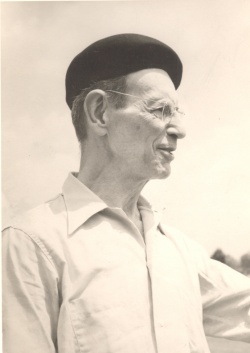Henry Hotchener: Difference between revisions
| Line 23: | Line 23: | ||
<blockquote> | <blockquote> | ||
Henry made a 1912 trip to India, where he met the Theosophical society leaders Annie Besant and C. W. Leadbeater, as well as a young woman named Marie Rusak, who | Henry made a 1912 trip to India, where he met the Theosophical society leaders Annie Besant and C. W. Leadbeater, as well as a young woman named Marie Rusak, who moved to California with him in 1916 and became his wife. Marie, the daughter of a California pioneer, Judge Allyn M. Barnard, and a graduate of Mills College, had given up an impressive singer career – including touring with John Philip Sousa's band, soloing with the Boston Symphony Orchestra, and singer opera in several European countries – to devote herself to the study of Theosophy. After meeting Besant in India, Marie became her deputy, traveling with her around the world to spread Theosophy's good news, before Marie became a celebrated lecturer in her own right.<ref>Michael N. McGregor, ''Pure Act: The Uncommon Life of Robert Lax'' (Fordham University Press, 2017), 57.</ref> | ||
</blockquote> | </blockquote> | ||
Revision as of 02:18, 10 February 2023
UNDER CONSTRUCTION
UNDER CONSTRUCTION
Henry Hotchener was an American member of the Theosophical Society in America. He is best known as the husband of Marie Russak Hotchener and co-editor with her of World Theosophy.
Personal life
Career
Around 1929, Hotchener was working as the business manager for actor John Barrymore.
According to Barrymore's biographer Gene Fowler, Henry (who spelled the family name Hotchener) "served a secretary to Daniel Guggenheim, President of the American Smelting and Refining Company and head of the vast Guggenheim family enterprises," then as "general manager of a realty enterprise of Maximilian Morgenthau," the uncle of Franklin Roosevelt's secretary of the treasury, Henry Morgenthau Jr., before becoming deeply interested in after-death phenomena and oriental philosophy."[1]
Theosophical Society involvement
He first met Alexander Fullerton in June, 1900, and that encounter started his interest in Theosophy.[2] That same year he met New York Theosophist Arthur Jacoby, beginning a lifelong friendship and correspondence. Other close friends included other prominent Theosophists – Dr. George DeHoff of Baltimore and Charles Luntz of St. Louis. He was admitted to the American Theosophical Society as a member on February 4, 1902, sponsored by Alexander Fullerton and Frank F. Knothe.[3]
From the beginning, Hotchener was active in the Society. During the Founder-President Henry Steel Olcott's final visit to the United States, Hotchener was one of the speakers in Chicago, where the 20th Convention was held.[4] Initially a member of the New York Lodge, in 1921 he transferred to the Krotona Lodge, then in Hollywood. Five years later he transferred again, to the Besant Hollywood Lodge, where he and his wife were members until their deaths.
Henry made a 1912 trip to India, where he met the Theosophical society leaders Annie Besant and C. W. Leadbeater, as well as a young woman named Marie Rusak, who moved to California with him in 1916 and became his wife. Marie, the daughter of a California pioneer, Judge Allyn M. Barnard, and a graduate of Mills College, had given up an impressive singer career – including touring with John Philip Sousa's band, soloing with the Boston Symphony Orchestra, and singer opera in several European countries – to devote herself to the study of Theosophy. After meeting Besant in India, Marie became her deputy, traveling with her around the world to spread Theosophy's good news, before Marie became a celebrated lecturer in her own right.[5]
He and Marie lived at Adyar for two years (1935-1937) and attended conventions there in many other years.[6]
Resources
- Extensive correspondence with Arthur Jacoby. Arthur Jacoby Papers. Records Series 25.18. Theosophical Society in America Archives.
Notes
- ↑ Michael N. McGregor, Pure Act: The Uncommon Life of Robert Lax (Fordham University Press, 2017), 56-57. Quoting Gene Fowler's book Good Night, Sweet Prince: The Life and Times of John Barrymore. NY: The Viking Press, 1944.
- ↑ Henry Hotchener letter to Arthur Jacoby. June 9, 1950. Arthur Jacoby Papers. Records Series 25.18. Theosophical Society in America Archives.
- ↑ Membership records no. 01201-01203. Ledger Cards 4. Theosophical Society in America Archives.
- ↑ "Program of the 20th Annual Convention" The Theosophic Messenger 7 no.12 (September, 1906): 182.
- ↑ Michael N. McGregor, Pure Act: The Uncommon Life of Robert Lax (Fordham University Press, 2017), 57.
- ↑ "En Route to India" The American Theosophist 34.2 (Feb 1946): 44.
